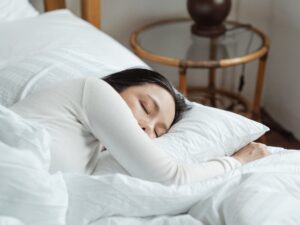Struggling to attain sufficient sleep consistently?
For some individuals, the process of falling asleep and maintaining a peaceful night’s rest can prove challenging. Numerous factors influence the quality of your sleep, and on any particular night, any of these elements may lead to a restless experience, characterized by tossing and turning or fixating on the bedside clock.
We often underestimate the power of a good night’s sleep. But beyond waking up feeling refreshed, consistent sleep plays a crucial role in safeguarding your health. Chronic sleep deprivation can pave the way for a multitude of serious health issues
Here are 5 tips to Sleep faster.
1. Create a Relaxing Bedtime Routine
Before going for sleep disconnect from electronic devices.
Set a Consistent Sleep Schedule. You can set up for the same bedtime and wake-up time everyday, even on weekends. This helps regulate your body’s natural sleep-wake cycle.
Engage in calming activities like quick body massage or calming music helps in sleeping faster. Opt for calming activities like reading, taking a warm bath, or gentle stretching.

2. Optimize Your Sleep Environment
Make your bedroom a haven for slumber. Ensure it’s cool, dark, quiet, and clutter-free. Invest in blackout curtains, earplugs, and a comfy mattress.

3. Mindful Breathing Techniques
Practice calming techniques like meditation, deep breathing, or progressive muscle relaxation to quiet your mind and ease into sleep.
4. Limit Screen Time Before Bed
Ditch screens at least an hour before bed. Opt for calming activities like reading, taking a warm bath, or gentle stretching.
5. Choose Sleep-Inducing Foods
Avoid heavy meals and sugary snacks close to bedtime. Opt for light, calming foods like bananas, chamomile tea, or warm milk.
Bonus Tips :
- Get Some Sun: Regular exposure to daylight helps regulate your sleep-wake cycle. Spend time outdoors during the day, even if it’s just for a short walk.
- Manage Stress and Anxiety
FAQ’s
- 1. How long should it take to fall asleep?
Generally, it takes most adults around 10-20 minutes to fall asleep. If it consistently takes you longer than 30 minutes, you might have insomnia and should consult a doctor.
- 2. What’s the ideal bedtime temperature for sleep?
A cool room between 60-67°F (15-19°C) is optimal for sleep. Your body temperature naturally dips at night, and a cool environment helps this process along.
- 3. Should I avoid screens before bed?
Absolutely! The blue light emitted from electronic devices like phones and laptops suppresses melatonin, the sleep hormone. Avoid screens for at least an hour before bedtime.
- 4. What about naps? Do they help or hurt sleep?
Short naps (20-30 minutes) can actually improve alertness and memory. However, long naps or napping late in the day can make it harder to fall asleep at night.
- 5. Does exercise help you sleep faster?
Regular exercise, done at least 3-4 hours before bedtime, can improve sleep quality and help you fall asleep faster. However, avoid strenuous workouts close to bedtime.
- 6. What should I eat and drink before bed?
Avoid heavy meals, caffeine, and alcohol before bed. Opt for light snacks like bananas, chamomile tea, or warm milk, which can promote relaxation and sleep.
